Abstract
Because being diagnosed with cancer is considered to be extremely stressful, cancer patients' mental adjustment has been widely studied. Previous studies have revealed that cancer patients' mental adjustment is correlated with the quality of life and the degree of psychological distress and have suggested that one of the most adaptive adjustments is 'fighting spirit' whereas one of the most maladaptive is 'helplessness/hopelessness'. However, little is known about the association between patients' mental adjustment to cancer and their spouses characteristics or social support network. This paper describes a study of cancer patients' characteristics and social support factors as predictors of the patients' responses to having cancer. A total of 455 ambulatory cancer patients completed the Mental Adjustment to Cancer (MAC) scale and participated in a structured interview about their characteristics and social support. The results of multiple regression analysis suggested that size of household, performance status, support from physicians and satisfaction with support were predictive of patients' fighting spirit, whereas age, education, size of household, performance status and satisfaction with support were predictive of helplessness/hopelessness.
Full text
PDF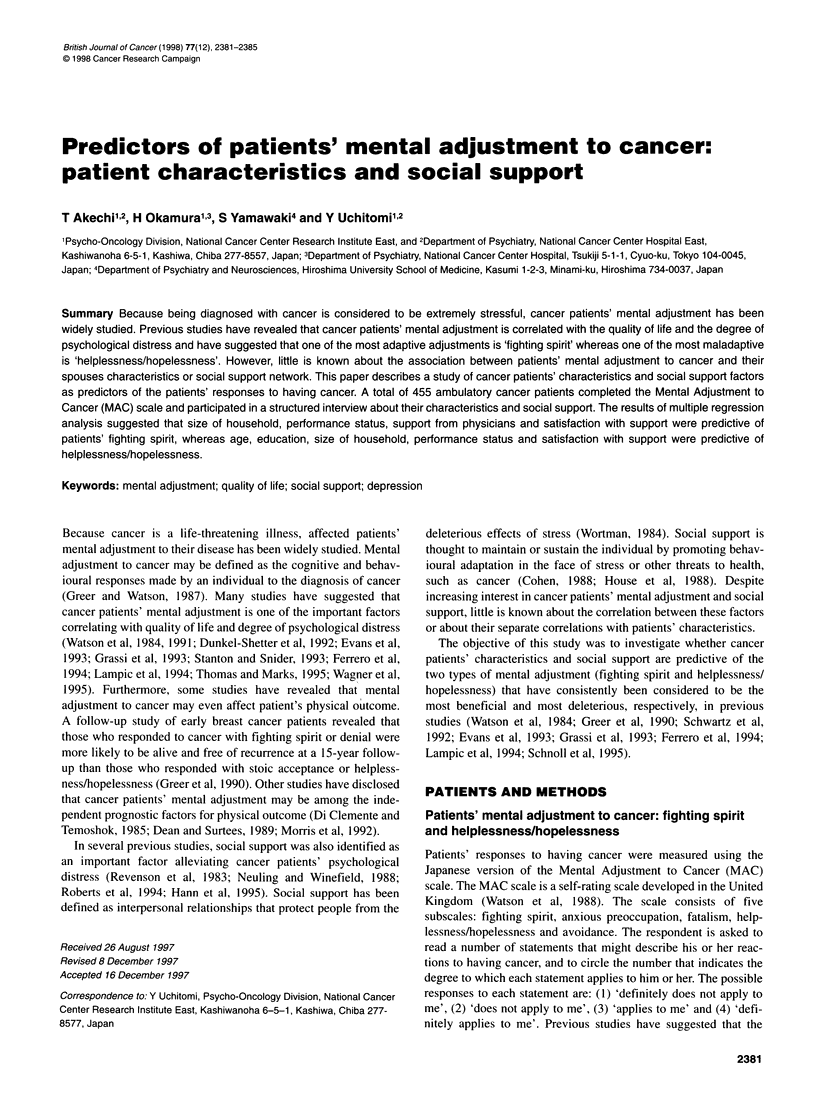
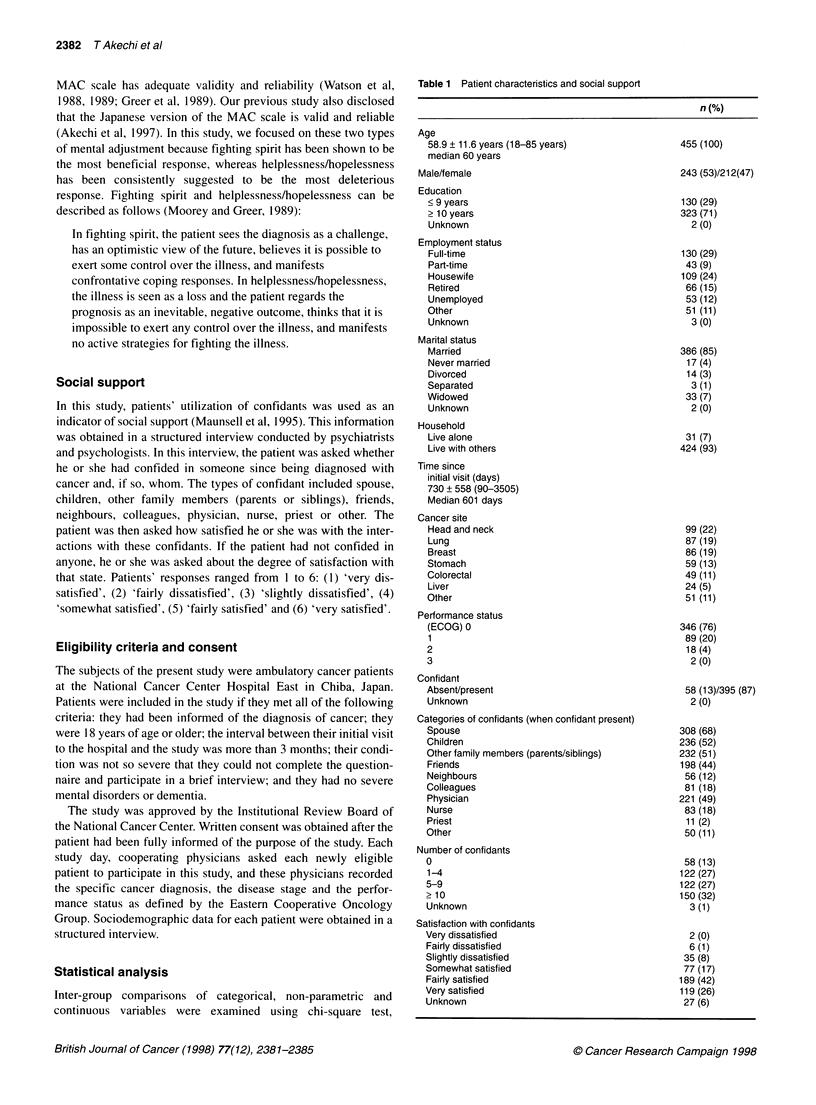
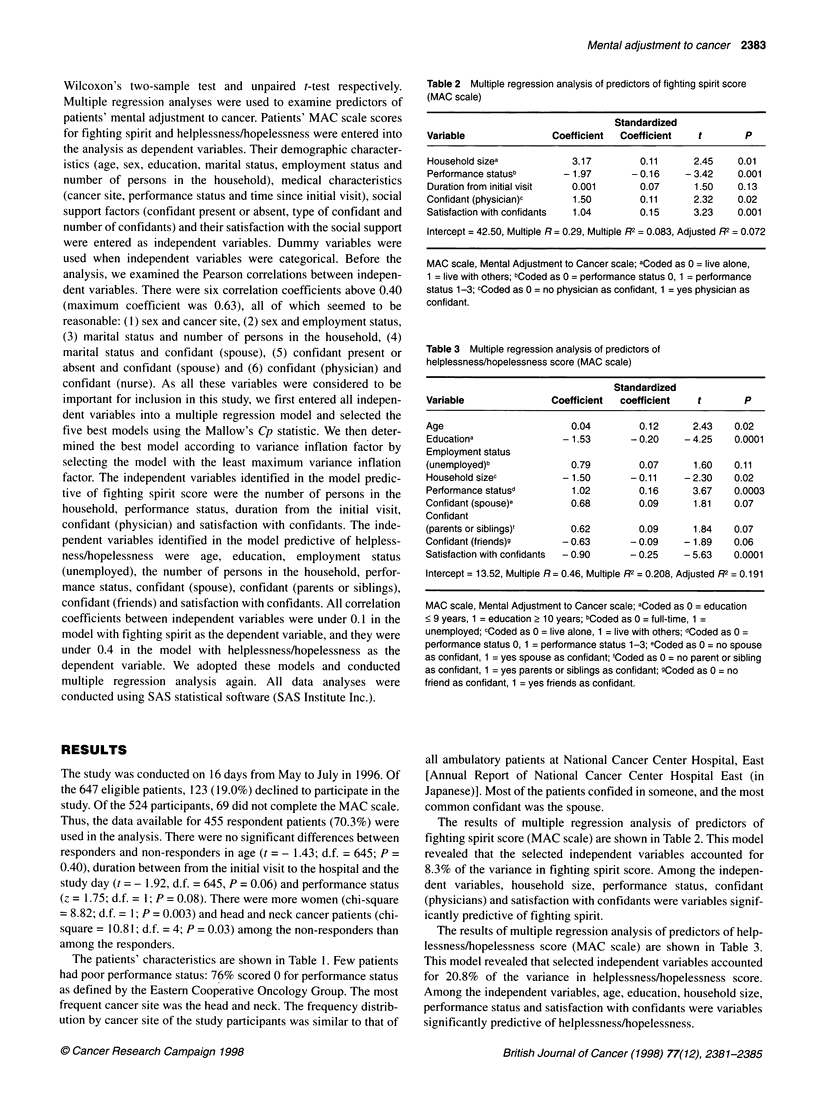
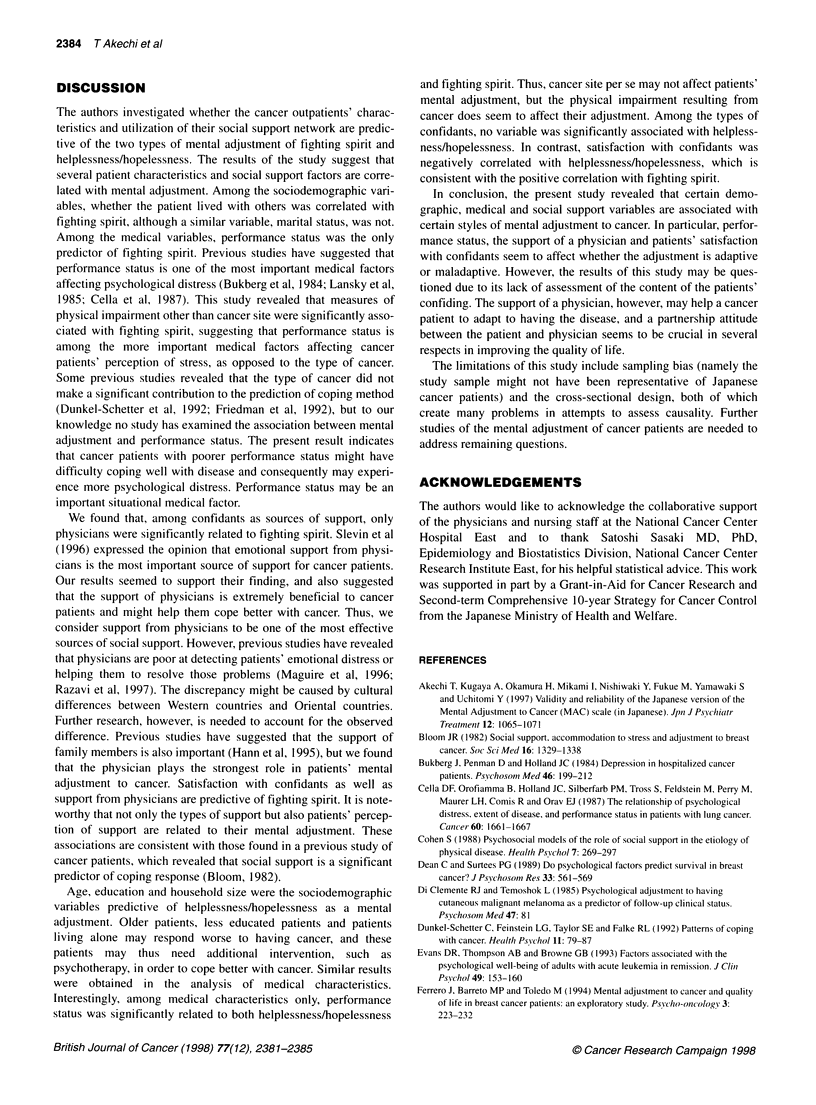
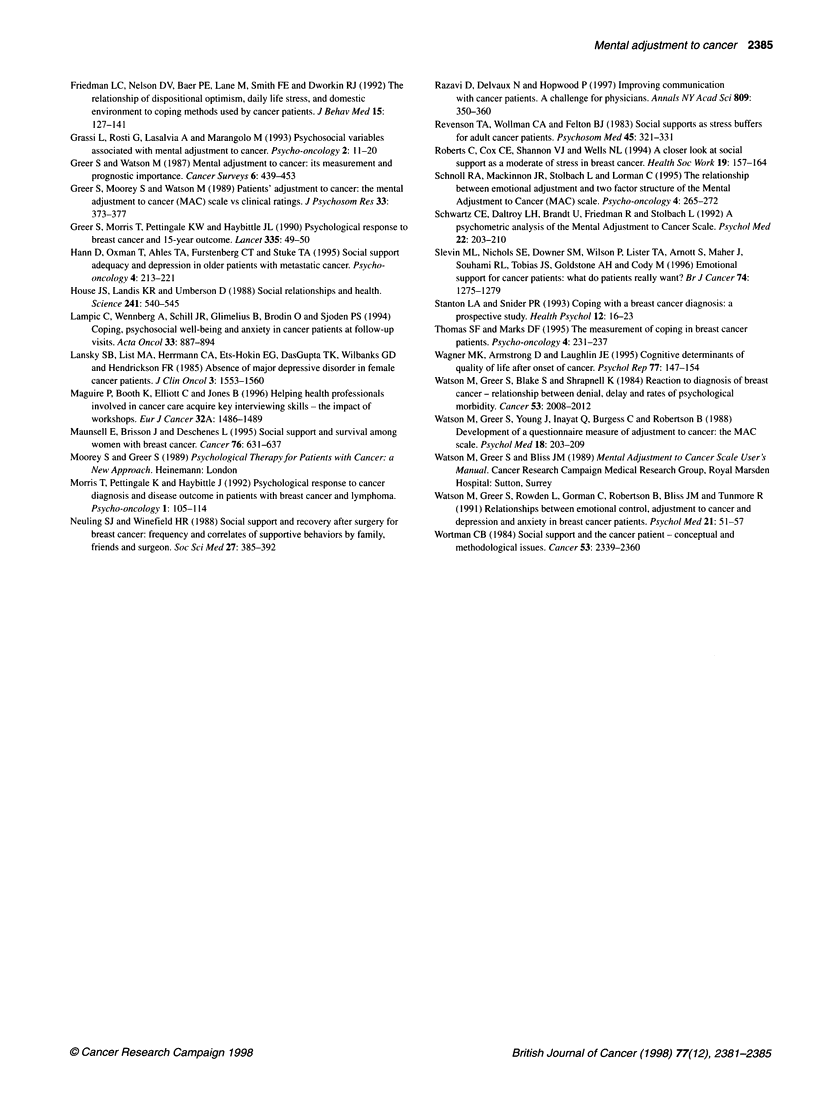
Selected References
These references are in PubMed. This may not be the complete list of references from this article.
- Bloom J. R. Social support, accommodation to stress and adjustment to breast cancer. Soc Sci Med. 1982;16(14):1329–1338. doi: 10.1016/0277-9536(82)90028-4. [DOI] [PubMed] [Google Scholar]
- Bukberg J., Penman D., Holland J. C. Depression in hospitalized cancer patients. Psychosom Med. 1984 May-Jun;46(3):199–212. doi: 10.1097/00006842-198405000-00002. [DOI] [PubMed] [Google Scholar]
- Cella D. F., Orofiamma B., Holland J. C., Silberfarb P. M., Tross S., Feldstein M., Perry M., Maurer L. H., Comis R., Orav E. J. The relationship of psychological distress, extent of disease, and performance status in patients with lung cancer. Cancer. 1987 Oct 1;60(7):1661–1667. doi: 10.1002/1097-0142(19871001)60:7<1661::aid-cncr2820600740>3.0.co;2-4. [DOI] [PubMed] [Google Scholar]
- Cohen S. Psychosocial models of the role of social support in the etiology of physical disease. Health Psychol. 1988;7(3):269–297. doi: 10.1037//0278-6133.7.3.269. [DOI] [PubMed] [Google Scholar]
- Dean C., Surtees P. G. Do psychological factors predict survival in breast cancer? J Psychosom Res. 1989;33(5):561–569. doi: 10.1016/0022-3999(89)90063-9. [DOI] [PubMed] [Google Scholar]
- Dunkel-Schetter C., Feinstein L. G., Taylor S. E., Falke R. L. Patterns of coping with cancer. Health Psychol. 1992;11(2):79–87. doi: 10.1037//0278-6133.11.2.79. [DOI] [PubMed] [Google Scholar]
- Evans D. R., Thompson A. B., Browne G. B., Barr R. M., Barton W. B. Factors associated with the psychological well-being of adults with acute leukemia in remission. J Clin Psychol. 1993 Mar;49(2):153–160. doi: 10.1002/1097-4679(199303)49:2<153::aid-jclp2270490204>3.0.co;2-p. [DOI] [PubMed] [Google Scholar]
- Friedman L. C., Nelson D. V., Baer P. E., Lane M., Smith F. E., Dworkin R. J. The relationship of dispositional optimism, daily life stress, and domestic environment to coping methods used by cancer patients. J Behav Med. 1992 Apr;15(2):127–141. doi: 10.1007/BF00848321. [DOI] [PubMed] [Google Scholar]
- Greer S., Moorey S., Watson M. Patients' adjustment to cancer: the Mental Adjustment to Cancer (MAC) scale vs clinical ratings. J Psychosom Res. 1989;33(3):373–377. doi: 10.1016/0022-3999(89)90027-5. [DOI] [PubMed] [Google Scholar]
- Greer S., Morris T., Pettingale K. W., Haybittle J. L. Psychological response to breast cancer and 15-year outcome. Lancet. 1990 Jan 6;335(8680):49–50. doi: 10.1016/0140-6736(90)90173-3. [DOI] [PubMed] [Google Scholar]
- Greer S., Watson M. Mental adjustment to cancer: its measurement and prognostic importance. Cancer Surv. 1987;6(3):439–453. [PubMed] [Google Scholar]
- House J. S., Landis K. R., Umberson D. Social relationships and health. Science. 1988 Jul 29;241(4865):540–545. doi: 10.1126/science.3399889. [DOI] [PubMed] [Google Scholar]
- Lampic C., Wennberg A., Schill J. E., Glimelius B., Brodin O., Sjödén P. O. Coping, psychosocial well-being and anxiety in cancer patients at follow-up visits. Acta Oncol. 1994;33(8):887–894. doi: 10.3109/02841869409098451. [DOI] [PubMed] [Google Scholar]
- Lansky S. B., List M. A., Herrmann C. A., Ets-Hokin E. G., DasGupta T. K., Wilbanks G. D., Hendrickson F. R. Absence of major depressive disorder in female cancer patients. J Clin Oncol. 1985 Nov;3(11):1553–1560. doi: 10.1200/JCO.1985.3.11.1553. [DOI] [PubMed] [Google Scholar]
- Maguire P., Booth K., Elliott C., Jones B. Helping health professionals involved in cancer care acquire key interviewing skills--the impact of workshops. Eur J Cancer. 1996 Aug;32A(9):1486–1489. doi: 10.1016/0959-8049(96)00059-7. [DOI] [PubMed] [Google Scholar]
- Maunsell E., Brisson J., Deschênes L. Social support and survival among women with breast cancer. Cancer. 1995 Aug 15;76(4):631–637. doi: 10.1002/1097-0142(19950815)76:4<631::aid-cncr2820760414>3.0.co;2-9. [DOI] [PubMed] [Google Scholar]
- Neuling S. J., Winefield H. R. Social support and recovery after surgery for breast cancer: frequency and correlates of supportive behaviours by family, friends and surgeon. Soc Sci Med. 1988;27(4):385–392. doi: 10.1016/0277-9536(88)90273-0. [DOI] [PubMed] [Google Scholar]
- Razavi D., Delvaux N., Hopwood P. Improving communication with cancer patients. A challenge for physicians. Ann N Y Acad Sci. 1997 Feb 20;809:350–360. doi: 10.1111/j.1749-6632.1997.tb48098.x. [DOI] [PubMed] [Google Scholar]
- Revenson T. A., Wollman C. A., Felton B. J. Social supports as stress buffers for adult cancer patients. Psychosom Med. 1983 Aug;45(4):321–331. doi: 10.1097/00006842-198308000-00006. [DOI] [PubMed] [Google Scholar]
- Roberts C. S., Cox C. E., Shannon V. J., Wells N. L. A closer look at social support as a moderator of stress in breast cancer. Health Soc Work. 1994 Aug;19(3):157–164. doi: 10.1093/hsw/19.3.157. [DOI] [PubMed] [Google Scholar]
- Schwartz C. E., Daltroy L. H., Brandt U., Friedman R., Stolbach L. A psychometric analysis of the Mental Adjustment to Cancer scale. Psychol Med. 1992 Feb;22(1):203–210. doi: 10.1017/s0033291700032864. [DOI] [PubMed] [Google Scholar]
- Slevin M. L., Nichols S. E., Downer S. M., Wilson P., Lister T. A., Arnott S., Maher J., Souhami R. L., Tobias J. S., Goldstone A. H. Emotional support for cancer patients: what do patients really want? Br J Cancer. 1996 Oct;74(8):1275–1279. doi: 10.1038/bjc.1996.529. [DOI] [PMC free article] [PubMed] [Google Scholar]
- Stanton A. L., Snider P. R. Coping with a breast cancer diagnosis: a prospective study. Health Psychol. 1993 Jan;12(1):16–23. doi: 10.1037//0278-6133.12.1.16. [DOI] [PubMed] [Google Scholar]
- Wagner M. K., Armstrong D., Laughlin J. E. Cognitive determinants of quality of life after onset of cancer. Psychol Rep. 1995 Aug;77(1):147–154. doi: 10.2466/pr0.1995.77.1.147. [DOI] [PubMed] [Google Scholar]
- Watson M., Greer S., Blake S., Shrapnell K. Reaction to a diagnosis of breast cancer. Relationship between denial, delay and rates of psychological morbidity. Cancer. 1984 May 1;53(9):2008–2012. doi: 10.1002/1097-0142(19840501)53:9<2008::aid-cncr2820530934>3.0.co;2-b. [DOI] [PubMed] [Google Scholar]
- Watson M., Greer S., Rowden L., Gorman C., Robertson B., Bliss J. M., Tunmore R. Relationships between emotional control, adjustment to cancer and depression and anxiety in breast cancer patients. Psychol Med. 1991 Feb;21(1):51–57. doi: 10.1017/s0033291700014641. [DOI] [PubMed] [Google Scholar]
- Watson M., Greer S., Young J., Inayat Q., Burgess C., Robertson B. Development of a questionnaire measure of adjustment to cancer: the MAC scale. Psychol Med. 1988 Feb;18(1):203–209. doi: 10.1017/s0033291700002026. [DOI] [PubMed] [Google Scholar]
- Wortman C. B. Social support and the cancer patient. Conceptual and methodologic issues. Cancer. 1984 May 15;53(10 Suppl):2339–2362. doi: 10.1002/cncr.1984.53.s10.2339. [DOI] [PubMed] [Google Scholar]


